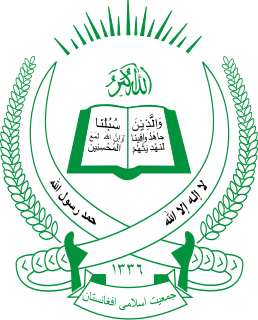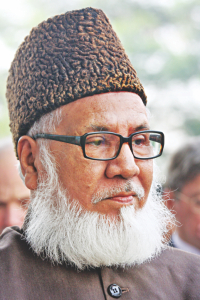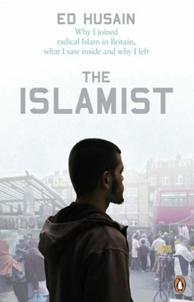Background
The ISB's first president was Zahid Parvez. On 16 November 2013 Sughra Ahmed was elected president of ISB, the first female to hold that post. [3] According to Islamic Organizations in Europe and the USA, the society caters to non-Arab Sunni Muslims, born and brought up in Britain. [4] Anti-Islamist author, Ed Husain, who participated in an ISB "Usrah" religious study group in the 1990s, describes the society as "proudly British", predominately middle class and professional. [5]
According to the book The Muslim Brothers in Europe: Roots and Discourse, the society is "based on a chaotic partnership" between members or former members of the Muslim Brotherhood and former members of Jamaat-e-Islami. [6] R. Geaves describes ISB as one of several movements that "have their ideological roots in the activism of Sayyid Qutb and Maulana Mawdudi", but whose "radical voice that called for an Islamic state has been toned down to a gradualist approach and the emergence of `British Islam`." [7]
According to Husain, the society broke with Jamaat-e-Islami, and has taken a "vehement stand" against the global, neo-caliphate Islamist group Hizb ut-Tahrir.
In 1997, some supporters of the Muslim Brotherhood "broke off" from ISB to form the Muslim Association of Britain, and Husain writes, some bitterness remains between the two groups. [8] According to Anshuman A. Mondal, the society "has been one of a large number" of British Muslim "organizations, individuals and processes ... that have been contesting older Islamist ideas, to varying degrees.". [9]
Activities
The activities of ISB are held at local, regional and national levels. They encompass a range of events, which contribute to fulfilling ISB's aims and vision. These include:
Launched in 1994 by ISB, Islam Awareness Week aims to combat stereotypes and misconceptions surrounding Islam and Muslims. [10] Most notably, the campaign was featured on the social media platform Snapchat with a filter that was captioned ‘Young, Muslim and British’ in March 2017. The filter allowed users of the platform to share messages about the role Islam plays in their lives.
- Radio broadcasting
- Exhibitions
- Conferences
- Seminars
- Weekend spiritual development retreats
- Regional and national camps
- Lecture programs
- Study circles
- Dinners and social gatherings
- Jumu`ah (Friday prayer) provision at schools
- Sports tournaments
ISB also produces:
- Information leaflets
- Booklets
- Magazines
- Audio and video material
They run many national projects including:
The Islamic Society of Britain was an affiliate body of the Muslim Council of Britain until February 2016, when it disaffiliated.
Controversies
Screening of The Message
In 2015, on behalf of the ISB, The Grosvenor, a cinema in Glasgow, Scotland was due to screen The Message , an Oscar-nominated film about the life of the Muhammad. [11] The screening was met with opposition by some groups, claiming that the film was disrespectful and offensive to Muslims, and following threats the screening was cancelled. [11] In response to the cancellation, the ISB said:
“These protestors demonstrate the worst elements of our community, as they are imposing their beliefs on others.” [12]
They also expressed “deep regret” that a decision had been made based on what it viewed as a “small number of objections.” [12]
Poppy hijabs
Joining Remembrance traditions to remember those fallen in war, the ISB launched a version of the customary poppy in the form of a ‘poppy hijab’, a headscarf designed with printed poppies for Muslim women as a way for them to support the campaign. [13] The hijab was created in collaboration with think-tank, British Future and also aimed to remember the Muslim soldiers who had also fought in World War I. The president of ISB, Sughra Ahmed said:
“It’s a way for ordinary Muslim citizens to take some attention away from extremists who seem to grab the headlines. This symbol of quiet remembrance is the face of everyday British Islam – not the angry minority who spout hatred and offend everyone.” [13]
The move was met with opposition by some British Muslims who viewed it as a ‘test’ for British Muslims who had to prove their loyalty to Britain and to show that they were not ‘extremists’. [14] [13]
Further objections also included that the hijab, which many treat as a sign of religiosity and devotion to God, should not be used as a political tool. [15]

Hezb-e-Islami, lit. Islamic Party, was an Islamist organization that was commonly known for fighting the Communist Government of Afghanistan and their close ally the Soviet Union. Founded and led by Gulbuddin Hekmatyar, it was established in Afghanistan in 1975.

Jamaat-e-Islami, or Jamaat as it is simply known, is an Islamist political party which is based in Pakistan and it is the Pakistani successor to Jamaat-e-Islami, which was founded in colonial India in 1941. Its objective is the transformation of Pakistan into an Islamic state, governed by Sharia law, through a gradual legal, and political process. JI strongly opposes capitalism, communism, liberalism, socialism and secularism as well as economic practices such as offering bank interest. JI is a vanguard party: its members form an elite with "affiliates" and then "sympathizers" beneath them. The party leader is called an ameer. Although it does not have a large popular following, the party is quite influential and considered one of the major Islamic movements in Pakistan, along with Deobandi and Barelvi.

Tablighi Jamaat is a transnational Sunni Islamic missionary movement that focuses on exhorting Muslims to be more religiously observant and encouraging fellow members to return to practising their religion as per the Islamic prophet Muhammad, and secondarily to impact non-Muslims. "One of the most widespread Sunni" islah (reform) and daʿwa (missionary) organizations "in the world today", and called "one of the most influential religious movements in 20th-century Islam," the organisation is estimated to have between 12 and 80 million adherents worldwide, in over 150 countries, with the majority living in South Asia.
Khurshīd AhmadPhD, DSc, NI, is a Pakistani economist, philosopher, politician, and an Islamic activist who helped to develop Islamic economic jurisprudence as an academic discipline and one of the co-founders of The Islamic Foundation in Leicester, UK.
Qazi Hussain Ahmad was an Islamic scholar, democracy activist, and former Emir of Jamaat-e-Islami, the socially conservative Islamist political party in Pakistan.

Jamayat-E-Islami, sometimes shortened to Jamiat, is a political party in Afghanistan.It was originally formed as a student political society at Kabul University. The majority of the party are ethnic Tajiks of northern and western Afghanistan. It has a communitarian ideology based on Islamic law. During the Soviet–Afghan War and the following Afghan Civil War against the communist government, Jamiat-e Islami was one of the most powerful of the Afghan mujahideen groups. Burhanuddin Rabbani led the party from 1968 to 2011, and served as President of the Islamic State of Afghanistan from 1992 to 2001, on exile from 1996.

Tanzeem-e-Islami is an Islamic organisation that advocates the implementation of the Quran and Sunnah in the social, cultural, legal, political, and the economic spheres of life; and the "refutation of the misleading thoughts and philosophy of modernity".

Motiur Rahman Nizami was a politician, former Minister of Bangladesh, Islamic scholar, writer, and the former leader of the Bangladesh Jamaat-e-Islami.Al-Badr Bangladesh Liberation War. On 29 October 2014, he was convicted and later executed blaming of masterminding the Demra massacre by the International Crimes Tribunal of Bangladesh. Turkey withdrew Bangladesh ambassador after Jamaat-e-Islami leader Nizami's execution (BBC). A large number of Human rights organisations of the world protested against the judicial killing of Nizami and declare it an unfair trail against Nizami. He was the Member of Parliament for the Pabna-1 constituency from 1991 to 1996 and again from 2001 to 2006. He also served as the Bangladeshi Minister of Agriculture and Minister of Industry.
Jamaat-ul-Mujahideen is an Islamic terrorist organisation operating in Bangladesh. It is also listed as a terror group by the UK. It was founded in April 1998 in Palampur in Dhaka Division by Abdur Rahman and gained public prominence in 2001 when bombs and documents detailing the activities of the organisation were discovered in Parbatipur in Dinajpur district. The organisation was officially declared a terrorist organisation and banned by the government of Bangladesh in February 2005 after attacks on NGOs. But it struck back in mid-August when it detonated 500 small bombs at 300 locations throughout Bangladesh. The group re-organised and has committed several public murders in 2016 in northern Bangladesh as part of a wave of attacks on secularists.

The Islamist: Why I Joined Radical Islam in Britain, What I Saw Inside and Why I Left is a 2007 book about Ed Husain's five years as an Islamist. The book has been described as "as much a memoir of personal struggle and inner growth as it is a report on a new type of extremism." The son of pious Muslim parents from South Asia, living in East London, Husain joins the Islamist group Young Muslim Organization at the age of sixteen, before moving on to be active in Hizb ut-Tahrir while in college. After disheartening experiences with factional infighting and sectarian violence at his college, and unIslamic behavior while living in Saudi Arabia as an English teacher, Husain rejects political Islam and returns to "normal" life and his family. Husain describes his book as explaining "the appeal of extremist thought, how fanatics penetrate Muslim communities and the truth behind their agenda of subverting the West and moderate Islam."
Quilliam was a British think tank co-founded in 2008 by Maajid Nawaz that focused on counter-extremism, specifically against Islamism, which it argued represents a desire to impose a given interpretation of Islam on society. Founded as The Quilliam Foundation and based in London, it claimed to lobby government and public institutions for more nuanced policies regarding Islam and on the need for greater democracy in the Muslim world whilst empowering "moderate Muslim" voices. The organisation opposed any Islamist ideology and championed freedom of expression. The critique of Islamist ideology by its founders―Nawaz, Rashad Zaman Ali and Ed Husain―was based, in part, on their personal experiences. Quilliam went into liquidation in 2021.

The Islamic Forum of Europe (IFE) is an Islamic organisation based in the United Kingdom with affiliates in Europe. Its charitable arm is the Islamic Forum Trust.

Syed Sadatullah Husaini is the president (Amir) of Jamaat-e-Islami Hind (JIH). He is the former National President of Students Islamic Organisation of India. He has been heading the JIH's Study and Research Department as its director. He is a regular columnist in various magazines, journals and newspapers writing on current issues and state of affairs. He is based in Hyderabad.
Muḥammad Manz̤oor Nomānī was an Indian Islamic scholar. Prominent among his written works are Maariful Hadith, Islam Kya Hai?, and Khomeini and the Iranian Revolution.

Bangladesh Jamaat-e-Islami, previously known as Jamaat-e-Islami Bangladesh, or Jamaat for short, was the largest Islamist political party in Bangladesh. On 1 August 2013, the Bangladesh Supreme Court declared the registration of the Bangladesh Jamaat-e-Islami illegal, ruling that the party is unfit to contest national elections.

Jamaat-e-Islami is an Islamic movement founded in 1941 in British India by the Islamic theologian and socio-political philosopher, Syed Abul Ala Maududi. Along with the Muslim Brotherhood, founded in 1928, Jamaat-e-Islami was one of the original and most influential Islamist organisations, and the first of its kind to develop an ideology based on the modern revolutionary conception of Islam.
Muhammad Ahsan Dar is an Indian Islamist militant separatist leader from Jammu and Kashmir. He was the founder of an Islamist militant group called Ansarul Islam in mid-1980s, which later became the core of Hizbul Mujahideen. Formed in September 1989, Hizbul Mujahideen was an umbrella group of a dozen Islamist groups in the Kashmir Valley and was sponsored by Pakistan's Inter-Services Intelligence and Jamaat-e-Islami. Ahsan Dar served as the head of the united group for a few years, but was marginalised the Jamaat-e-Islami patron Syed Salahuddin. He later founded a new group called Muslim Mujahideen in 1992, which operated for a few years. It was eventually neutralised by Hizbul Mujahideen and Indian security forces, and Ahsan Dar retired from militancy.
Nizam-e-Islam is a political party in Bangladesh which was created in East Pakistan. It was one of the four political parties of The United Front or Juktofront.
Islamism has existed in the United Kingdom since the 1970s, and has become widely visible and a topic of political discourse since the beginning of the 21st century.

Hizb ut-Tahrir Britain is the British branch of Hizb ut-Tahrir, a transnational, pan-Islamist and fundamentalist group that seeks to re-establish "the Islamic Khilafah (Caliphate)" as an Islamic "superstate" where Muslim-majority countries are unified and ruled under Islamic Shariah law, and which eventually expands globally to include non-Muslim states such as Britain.












